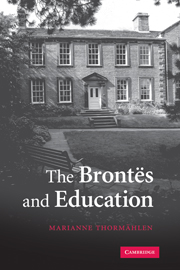14 - Docility and originality
Published online by Cambridge University Press: 22 September 2009
Summary
DOCILITY, ORIGINALITY AND GENIUS
Jane Eyre's recapitulation of the education of young Adèle – just under twenty years old at the ending of the narrative – has aroused some disapproval among Brontë critics. Part of that disapproval is associated with a word in the sentence that was already quoted once in this book, at the opening of Section III:
As she grew up, a sound English education corrected in a great measure her French defects; and when she left school, I found in her a pleasing and obliging companion: docile, good-tempered, and well-principled.
(Jane Eyre III.xii.450)A present-day reader will naturally read the word ‘docile’ as meaning ‘submissive’ and may take it to imply that Jane assumes power over, even oppresses, Adèle; but that is not how 1847 readers would have understood it. Quite apart from the fact that the lady of the house would be in a position of some authority in relation to any junior member, especially a girl dependant, the primary meaning of ‘docile’ is not ‘submissive’ but ‘teachable’, and that is what it usually means in the fiction of Charlotte Brontë, as in much mid-nineteenth-century writing.
One example of ‘docility’ used in this sense occurs in The Complete Governess: ‘Every one who has had occasion to attend to [females] must have perceived, that in capacity they are no ways behind the other sex, and that they far exceed that sex both in diligence and in docility’ (p. 2).
- Type
- Chapter
- Information
- The Brontës and Education , pp. 199 - 208Publisher: Cambridge University PressPrint publication year: 2007

